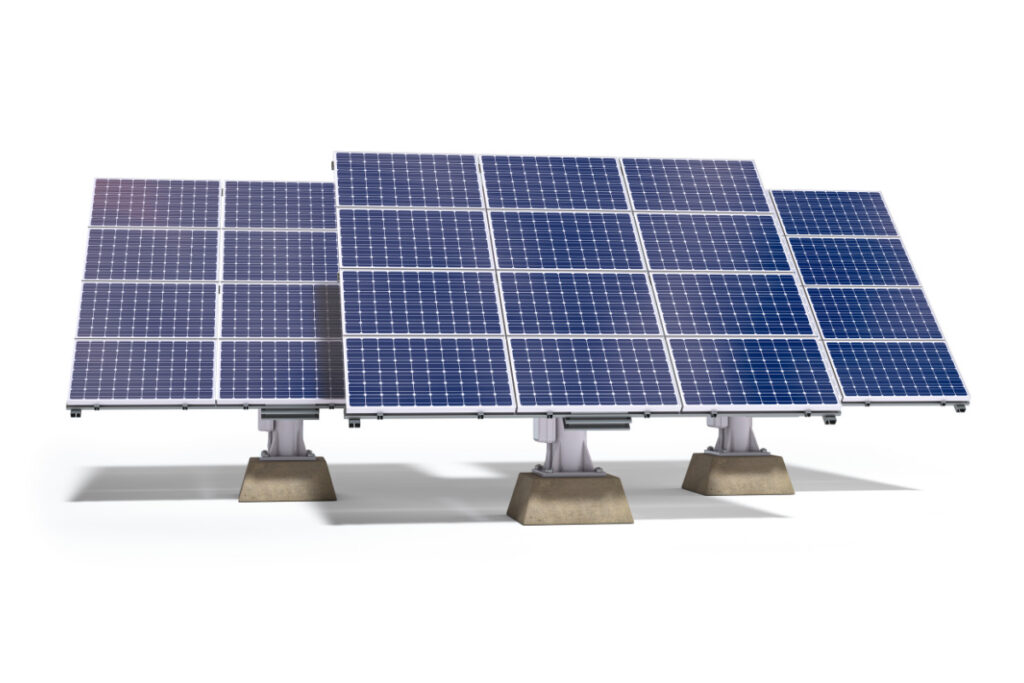Introduction
Are you considering investing in solar panels for your home or business and wondering if the IRS offers any financial incentives to support this eco-friendly choice? You’re in luck! The federal government provides several tax credits, including the Residential Clean Energy Credit, which allows homeowners to deduct up to 30% of the cost of installing a solar panel system.
This blog post will explore important details about these valuable incentives and how they can benefit your wallet and our environment.
| Key Takeaways |
|---|
| The IRS offers tax credits for solar panels, including the Residential Clean Energy Credit and Business Energy Investment Tax Credit. These incentives allow homeowners and businesses to deduct up to 30% of the cost of installing a solar panel system from their federal taxes. |
| To qualify for these tax credits, your solar panel system must be installed on residential or commercial property you own and use as a residence or business, meet certain quality standards set by federal guidelines, and be installed before December 31st, 2033. |
| Going solar with tax credits has many benefits, including financial savings, property value increase, environmental advantages in reducing carbon footprint while conserving natural resources like water and fossil fuels energy independence during power outages caused by severe weather conditions. |
| Note: Some information is repetitive but present differently in each section for better context comprehension. |
Understanding Solar Panel Tax Credits
The two primary tax credits for solar panel installations are the federal Investment Tax Credit (ITC) and state and local incentives (ITC). State and local incentives are the primary tax credits for solar panel installations.
Federal Investment Tax Credit (ITC)
The Federal Investment Tax Credit (ITC) provides a vital financial incentive for installing solar panels in the United States. Also referred to as the federal solar tax credit, it allows homeowners and businesses to cut their income taxes by 30% of their solar panel system cost. Take advantage of this program today to reap the rewards.
The ITC was initially introduced through the Energy Policy Act of 2005 and has been extended several times. The current legislation extends this valuable credit until 2033.
One significant advantage of the ITC is its flexibility. If your tax liability cannot claim the entire credit in one year, you can carry over any unused portion into future years’ taxes.
State And Local Incentives
In addition to the federal solar tax credit, some states, and local governments also offer solar panel installation incentives. These incentives vary depending on where you live, but they can include rebates, grants, property tax exemptions or reductions, sales tax exemptions or reductions, and performance-based incentives.
For example, California offers a rebate program that gives back up to $0.25 per watt of installed capacity for residential solar systems.
These state and local incentives can add up quickly and dramatically reduce out-of-pocket costs when going solar.
Qualifying For Solar Panel Tax Credits
To qualify for the federal tax credit, your solar system must be installed on residential or commercial property you own and use as a residence or business; read on to learn about specific requirements and eligibility criteria.
Residential And Commercial Property Requirements
To qualify for the Solar Tax Credit, your solar panel system must be installed on your property. This can include your primary residence, second home, or rental properties.
The property must also be located in the United States and have a “usable energy” requirement. Commercial properties such as businesses, non-profits, and government organizations are also eligible for the Business Energy Investment Tax Credit (ITC), which allows up to 30% credit for qualified expenditures until 2032 and then drops to 26% in 2033 until it expires in 2034.
Additionally, residential and commercial solar panel systems must meet specific quality standards set by federal guidelines like those provided by Underwriters Laboratories (UL).
Residential Solar Energy Property Credit
The Residential Solar Energy Property Credit is one of the most widely known tax credits available to homeowners. This credit applies only to residential properties and allows homeowners to deduct up to 30% of their solar system installation cost from their federal taxes.
For instance, if you install a $20,000 solar panel system on your home, you can claim a $6,000 tax credit against your tax liability. If qualified expenses exceed the maximum allowable amount for any given year’s credit, unused portions may be carried forward to future years.
The current Residential Solar Energy Property Credit is set at 30% through the end of 2032 before being reduced in subsequent years.
Business Energy Investment Tax Credit
The Business Energy Investment Tax Credit (ITC) is a federal tax incentive that supports businesses investing in renewable energy. This includes solar panels, wind turbines, and other forms of clean energy equipment.
Businesses can claim a credit of 30% of the total project cost for systems installed before December 31st, 2032. For example, if your business spends $100,000 on a solar panel system installation, you may be eligible for an ITC worth $30,000 as a tax credit against the company’s federal income taxes owed.

How To Claim Solar Panel Tax Credits
To claim the Solar Tax Credit, you must fill out IRS Form 5695 and submit it with your tax return, but there are some restrictions and deadlines you should be aware of – read on to learn more!
Filling Out IRS Form 5695
To claim the solar panel tax credit, you must fill out IRS Form 5695. This form calculates your total residential energy credits and determines the federal tax credit you can claim for your solar panels.
You must provide basic information about yourself, including your name, address, and social security number. Then you’ll be asked to enter the costs associated with qualifying renewable energy equipment installed on your property.
It’s essential to keep detailed records of all expenses related to the installation process to properly have everything needed when filling out Form 5695. Remember that it’s crucial only to list those expenses attributed solely to clean energy property as they are the only ones eligible for receiving a tax refund.
Submitting With Tax Return
To claim your solar panel tax credit, you must fill out IRS Form 5695 and attach it to your tax return. The Residential Clean Energy Credit is the most common tax credit for solar panels, but business energy investment credits are also available.
You can claim any unused portion of the ITC on future returns if you don’t owe enough taxes this year or carry forward any remaining balance after filing this year’s taxes.
It’s important to keep your receipts and documentation regarding your solar panel installation as evidence when submitting your tax return.
Deadline And Restrictions
To qualify for the Residential Clean Energy Credit, you must install your solar panel system by December 31, 2032. However, it’s important to note that the credit percentage decreases after 2022 and eventually phases out entirely in 2034.
Furthermore, the tax credit is only applicable to new systems. You cannot claim the credit if an existing solar panel system is installed before this period.
Additionally, certain expenses may not qualify for the credit. Although solar panels usually qualify, labor costs or battery backups may not be eligible.
Benefits Of Going Solar With Tax Credits
Going solar with tax credits has many benefits, including financial savings, increased property value, environmental advantages, energy independence, and a future-proof investment.
Financial Savings
Going solar can result in significant financial savings for homeowners and businesses alike. By taking advantage of the Solar Tax Credit, you could deduct up to 30% of the total cost of your solar panel system from your federal income taxes.
If you spend $20,000 on a solar panel installation, you may be eligible for a $6,000 tax credit. Additionally, installing solar panels can help reduce your monthly electricity bills by generating clean energy directly from the sun.
Depending on where you live and how much electricity you use each month, it’s possible to recoup the cost of your initial investment within just a few years or less.
Property Value Increase
Adding solar panels to your home saves you money on energy bills and can increase your property’s value increases the value of your property. A U.S. Department of Energy study found that homes with solar panels sell faster and for higher prices than those without them.
On average, homes with solar systems installed sold for about $15,000 more than similar non-solar homes.
Moreover, having a solar panel system in place means that potential buyers won’t have to install one themselves, saving time and hassle.
Environmental Advantages
Installing solar panels can significantly reduce your carbon footprint and contribute to a healthier environment. Solar energy is clean and renewable, meaning it produces no harmful emissions or pollutants that harm the environment.
According to the U.S. Department of Energy, if every home in America installed solar panels, it would be equivalent to taking 12 million cars off the road for an entire year.
In addition to reducing pollution, solar energy conserves natural resources like water and fossil fuels. Unlike traditional power sources, such as coal or gas plants, which require large amounts of water for cooling during production processes, solar power requires virtually no water.
This means less strain on our limited freshwater supplies and less stress on local ecosystems that rely on consistent water levels for survival.
Energy Independence
Going solar can help you achieve energy independence. Installing solar panels generates electricity and reduces reliance on traditional utility companies for power.
Transitioning to solar energy can make you less vulnerable to power outages due to external factors beyond your control. Additionally, the Solar Tax Credit provides significant savings on installation costs, making it a smart long-term investment. Make the switch to solar energy today to enjoy these benefits.
Future-Proof Investment
Investing in solar panels provides immediate financial savings and is a future-proof investment. As energy prices continue to rise, generating electricity through solar panels becomes more and more valuable.
Additionally, as the demand for renewable energy sources increases, the value of homes with installed solar panel systems also rises.
Furthermore, as governments worldwide try to combat climate change by reducing greenhouse gas emissions and promoting clean energy sources, tax incentives like the Solar Tax Credit may become even more advantageous.
The Biden administration has proposed making significant changes to current tax laws related to solar power, which could further boost their benefits for homeowners and businesses alike.

Updates And Changes To Solar Panel Tax Credits
Future Of Solar Panel Tax Credits
The future of solar panel tax credits looks promising as the Biden administration proposes expanding and extending them. Under the new plan, the existing 26% federal tax credit for residential solar installations would increase to 30% and include standalone energy storage systems.
Additionally, the proposed extension would make the credit available beyond its current expiration date of December 31, 2023. The proposal also aims to create a direct payment option for clean energy projects where tax credits could be cashed in all at once instead of being spread over several years.
This is excellent news for homeowners looking to go solar and reap financial savings while reducing their environmental impact.
Conclusion
If you’re considering going solar, the good news is that the IRS offers tax credits for solar panels. With federal and state incentives available, homeowners and businesses can save on installation costs while benefiting from increased property value and energy independence.
Remember to consult a tax professional about your situation, as tax laws are subject to change.

Tax Laws Are Subject To Change, So It Is Always Recommended To Consult A Tax Professional For Specific Advice Regarding Your Individual Situation
It’s important to remember that tax laws are subject to change, and the information provided in this outline may not be entirely accurate or complete. As an AI language model, I cannot guarantee the tax information’s accuracy.
That being said, if you’re considering installing a solar panel system for your home or business, it’s always best to consult a qualified tax professional who can provide personalized advice based on your unique situation.
The federal solar tax credit is an excellent incentive for those interested in adopting renewable energy technology. It allows homeowners and businesses to deduct up to 30% of the installation cost from their federal taxes, which means significant savings over time.
Going solar with tax credits can be a significant financial decision for individuals and businesses – but only if done correctly! By working with a knowledgeable tax professional and staying up-to-date on current regulations and changes in the law (like Biden Administration’s proposed changes), you’ll ensure maximum return on investment while minimizing headaches down the road.
Ready to go solar? Contact DroneQuote
If you’re considering installing solar panels on your home, it’s important to understand the incentives available from the IRS. To ensure you get the facts on solar panel incentives today, turn to DroneQuote. Our team of experts can help you navigate the complex world of solar panel tax credits and ensure you take full advantage of any available incentives.
But don’t just take our word for it – check out our client reviews on Google to see how we’ve helped other homeowners make the most of their solar panel installations. Contact us today to get started on your solar journey with DroneQuote as your trusted guide.
FAQs
- Does the IRS offer tax credits for solar panel installations?
Yes, homeowners who install qualified residential solar panel systems can claim a Federal Solar Tax Credit on their taxes. The credit is worth up to 26% of the installation costs and applies to both new construction and existing homes.
- What qualifies a solar panel system for the Federal Solar Tax Credit?
A solar panel system must meet specific standards set by the government to qualify for the tax credit. These include being installed on your primary or secondary residence. It should also generate electricity for your home, meeting all applicable fire and electrical code requirements.
- Is there a limit to how much I can claim through the Federal Solar Tax Credit?
No, you can claim the federal tax credit for qualifying residential solar panels installed before December 31st of a given year without any maximum limit.
- How do I claim my tax credit for installing solar panels on my home?
File IRS Form 5695 with your annual income tax return form to claim the federal tax credit. Keep receipts or other documentation to confirm payment of installation expenses. You may need them for subsequent years or retroactive changes to eligibility criteria.


